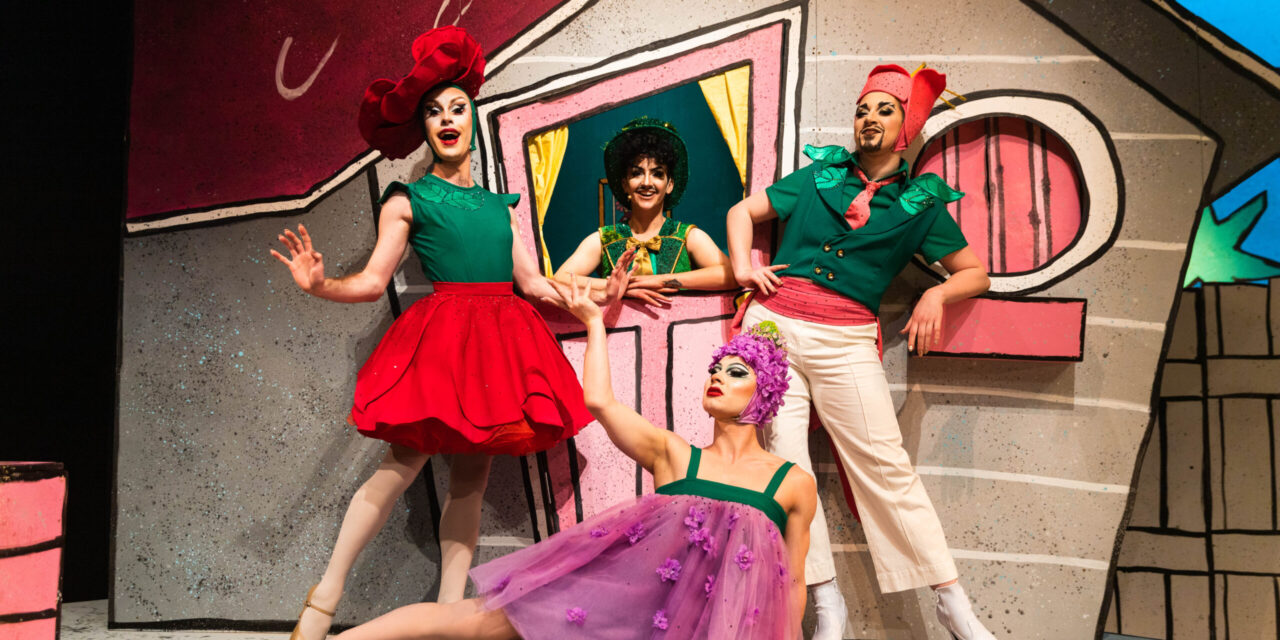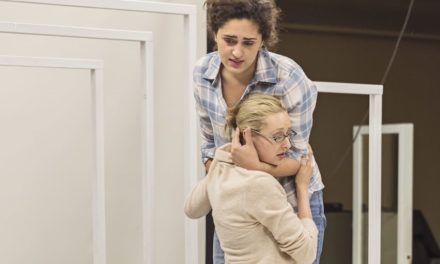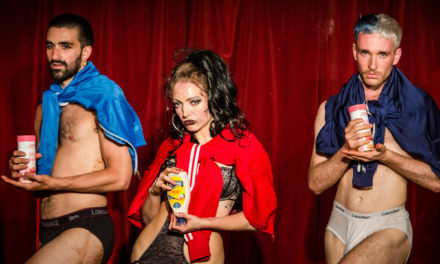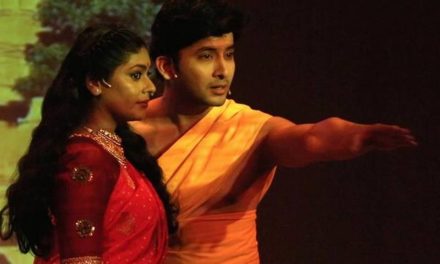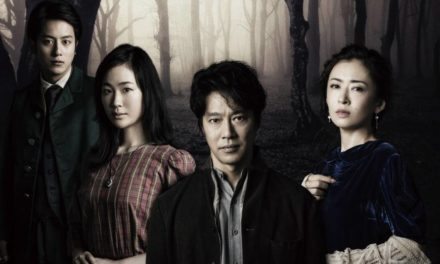The Glitter Garden by George Fowler and Lori Leigh. Directed by Lori Leigh. Circa Theatre, Wellington, 30 September – 10 October 2020.
Interview with playwrights George Fowler and Lori Leigh
In a year in which theatres in New Zealand were closed for extended periods due to the Coronavirus pandemic, one 2020 production stood out to me for its inclusivity, joyful experience and refreshing theatrical originality. Produced at Circa Theatre in Wellington soon after the second Covid lockdown ended in September 2020, The Glitter Garden was billed as a world-first, a drag musical extravaganza for children. The show featured a cast of drag performers led by Hugo Grrrl, the alter-ego of George Fowler, who co-wrote the script with director Lori Leigh. They had previously worked together on George’s solo show Princess Boy Wonder, the first season of which was cancelled due to the pandemic in New Zealand, and subsequently became the first New Zealand theatre show to be livestreamed during the nation-wide lockdown. The season of The Glitter Garden was accompanied by the launch of a book of the play, illustrated by Phillipa Clark. Like the production, the book quickly sold out.
I attended an 11am show of The Glitter Garden with a full house of exuberant children and their parents and caregivers. The lights came up on the brightly colored house and garden of Hugo the Gardener (Fowler), and from the first moments, Hugo engaged in spontaneous and often hilarious banter with the children in the audience. Hugo wants to plant a garden but is unsure how to begin. The garden comes alive with colorful characters – The Ever Changing Boy (Björn Åslund), Robin Yablind (Niko Walford) and Eva Goodnight (Nick Erasmuson) – who teach us how to grow a garden that celebrates patience, kindness and difference. These themes of inclusion and diversity are linked with the natural world and the environment. The narrative is punctuated with compulsively singable songs with original music by Maxwell Apse. While Hugo sings live, the other performers lip-sync, drag-style, to recordings. As the lights fade for the curtain call, the audience rises as one in a standing ovation.
How did this innovative show come about? I talked to George Fowler and Lori Leigh to discover the inside story on The Glitter Garden and the process by which it was created:
David O’Donnell: Could you both tell me a little about your theatre and performance backgrounds and what values matter to you most as performers and writers?
George Fowler: I only got back into performing about 5 -6 years ago and that was born of a gender identity crisis. I started event managing and performing in drag and comedy. Previous to that my only theatre experience was doing speech and drama through High School which I really loved. In terms of values the most awesome experience I had was getting into cabaret in Wellington and suddenly not being the biggest wierdo in the room, seeing people around me and people onstage who looked like me and who were celebrated, and that sense of validation was really foundational, a driving force behind what I do.
Lori Leigh: I consider myself a freelance director/dramaturg/playwright, and I teach theatre and do research here at Victoria University. Primarily my interests have been around new plays and playwriting, Shakespeare and Early Modern Drama, improv and comedy. I make a lot of diverse works but in all of them there’s this current of being interested in gender and sexuality. There are values I hold around process in the way that I make which have to do with collaboration and kindness and connection with other people. I want the work that I make to give people an experience, hopefully bring them joy. I think when it can bring people joy or catharsis and connection, and I love liveness. Recently in the work that I’ve been making with George my work has been a lot more personal. I’ve spent a lot of time working on other people’s projects. When George and I met up, George said I’m getting a little bored of the drag I’m doing in the same places and I said I’m getting a little bored of the theatre that I’m doing. This work is more personal and dynamic.
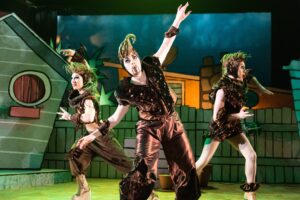
The Glitter Garden. Photo credit Roc Torio
DOD: In what ways would you say it’s more personal?
LL: This whole year in both Glitter Garden and Princess Boy Wonder I’ve been grappling with big questions around identity and my queerness and what has it meant for my life to be queer and there’s so many different answers to that. From growing up in a very conservative Christian Bible-belt part of the States where that was just not an option for my life. That whole journey for me as a queer person. During lockdown I binged all this queer television and I watched Gentleman Jack and anything I could get my hands on and it made me really really happy, but also made me sad, because all through my twenties and even growing up I never had that. I watched a show the other night that was set in a high school and two girls kiss and I thought, wouldn’t it have been nice to have a real first kiss in high school with someone that you’re actually attracted to?
DOD: Do you think things are changing in terms of queer representation in television and film and theatre?
LL: Absolutely. I still think there’s a long way to go. Yes, things have come a long way but there’s still a long way to go in terms of queer, and especially trans, representation– I’ll let George speak to this. Things are always getting better. With this show – there’s never been a drag musical for children before!
DOD: Well that brings us to The Glitter Garden. George, do you want to start off by saying what inspired you to make this show?
GF: As Lori said we both hit a point in our professional/personal lives where we were ready to make something like this. From my perspective I’d started to feel like I was preaching to the choir a little bit. I’d perform in nightclub settings for a majority of queer or queer-allied grown-up audiences, and I’d be making all these jokes about how it’s okay, and they know, they already knew that. And I started feeling like there’s this whole demographic of people who could use that message a little bit more. Honestly the seed of this idea came when I had strep throat and had this literal fever dream about a gardener pushing a drag queen flower in a wheelbarrow. It bloomed – quite literally – from that. So that was the seed of the idea and with Lori’s excellent storytelling and playwriting expertise it got hammered into something much larger and more beautiful.
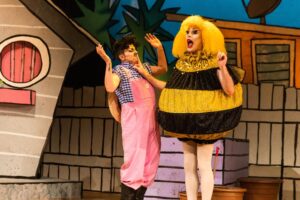
The Glitter Garden. Photo credit Roc Torio
DOD: So how did it happen, how did you start talking about it?
GF: Well Lori and I were going to collaborate on my solo show [Princess Boy Wonder] because I’d been out as a trans man for about a year.
LL: George had met with me and said I have these two ideas. I want to make some theatre work and I want to make a solo show about myself as a trans man and I also have this idea for a drag musical for children. They were happening at the same time but on really different timelines. We didn’t even have a script, we had a very skeleton idea of a story and pitched to Circa last June with that. Throughout the rest of the winter and the spring we went back and forth on working on Glitter Garden and the solo. We had a draft script of Glitter Garden, end of December, and then we’d have to put it aside for a little bit and work on the solo.
Once the script was done we started working on the music and other aspects, then went and did Princess Boy Wonder, then picked The Glitter Garden back up and at that point we were in lockdown. There was meant to be a production of it in Auckland in June, and we were programmed into Circa 2 for the September-October school holidays. When we went into lockdown we had a draft of the script and at that point we had started working with Maxwell [Apse] on the music. We had written lyrics and they were starting to come up with the song drafts. At the same time I was working on these contingency plans because everything was so up in the air and people kept going are you still going to do this? And I kept going yes we’re still going to do it no matter what. So much happened over those months. We lost Auckland Live because of the lockdown. We moved into Circa 1 because Circa lost a lot of their programming and they moved what they had left into Circa 1 so that they could do the social distancing. When we emerged from lockdown George and I had a script clinic with Playmarket and we wrote another draft of the script so we polished it up and then we started on finalizing the songs and recording them, and then we went into rehearsal.
DOD: So George, you literally had a dream and you had this desire to open up queer themes to a larger audience. Was it the same for you Lori or did you have different motivations?
LL: Well I didn’t have the same dream as George – I wish I had a dream about a gardener pushing a drag queen flower in a wheelbarrow! We already knew each other as acquaintances, but not super-well. I immediately connected with George and I thought this seems one hundred percent right for me, I’m going to prioritize this over all my other stuff, this feels like the correct thing for me to be doing right now. This was an opportunity to do something completely original, completely new, that spoke to things that I really care about as a person, things that have made my life happy and unhappy. I felt like I had something to say and these were a really good platform to say that. And then it was also fun, every time George and I were in a room. We literally sat in my lounge together or in my office, both of us with laptops open, and we’d just write together. One of us would come up with a rhyme, one of us would go “that’s not the right rhythm, let’s try this”, “what about this joke?”, “what if we told the joke this way?” It was really collaborative, really great synergy and we gelled and I already knew it was going to be something special because Princess Boy Wonder felt so right to me as well.
DOD: What kind of feedback did you get from Princess Boy Wonder?
GF: The show felt quite exciting because it was this deeply personal story meshed with really bright, colorful, exciting drag. I felt so vulnerable and we were trying something quite big, a lot of moving parts. I remember being stoked that it resonated with people and people generally really liked it. Queer community, theatre community and the general public who come out to Fringe shows.
LL: All three times we did it it got a standing ovation so that speaks to something when people take the energy to stand up. When we did the livestream got a lot of feedback from people who were overseas in various forms of lockdown that said it was bringing them a lot of joy and hope to be able to watch it even in its livestream form. And the people who saw it live here in Wellington, obviously queer people said that it resonated with them. It spoke to transness, it spoke to queerness, but it also spoke to sobriety and the larger theme of it – the same as The Glitter Garden – it’s about being yourself. I think anybody from any community can relate to that theme, and the pain and trauma we put ourselves through when we’re not being ourselves, when we’re trying to push parts of ourselves away.
GF: We definitely came in with a similar ethos with both shows that people should walk out feeling energized and inspired, making queer theatre that is joyful and we really hope that everyone who goes to see Glitter Garden, no matter who they are, feels empowered to go forth and be a little bit braver, and be a little bit more expressive, be more themselves. Even though Princess Boy Wonder is a really significant story about being a trans man I hope that the straight people that come and see it leave feeling it’s a little more more acceptable to be weird, and themselves.
LL: My favorite line in Princess Boy Wonder says “I’m the princess and I’m also the knight that loved her enough to rescue her.” So I think another thing it speaks to is no matter your sexuality or gender, we all suffer from the gender binary. The idea that this is what you have to do to be a woman or be a man and this is the correct way to behave. This is not for you or this has to be for you, those old tropes of “men shouldn’t cry and be emotional” and “women are too emotional blah blah blah”. I think Princess Boy Wonder tore all those things down saying it doesn’t matter what your sexuality or gender identity is, anyone born on planet Earth is affected by the gender binary, and just to know that you can deconstruct that, that you don’t have to be bound by those really oppressive structures that society sets up for us.
DOD: So coming back to The Glitter Garden, you wrote it for children, is that because you wanted children to think about these things before the oppressive structures get to them?
LL: Even though The Glitter Garden’s a children’s show I think it’s an “everyone” show and that was shown by the people that came to see it. The best children’s stories operate through metaphor and you can get them at different levels. For me making stuff for children is fun, it gives you an excuse to say, let’s be super-colorful, let’s be super-glittery, let’s have flowers and snails and butterflies. Children are the best at audience interaction, they don’t have all these oppressive things like you must sit in a theatre and be quiet, so they’ll just say whatever. Also, as we wrote in the programme note, we wish we’d had this show when we were kids.
GF: It’s first and foremost a really great piece of children’s entertainment, and then that other stuff comes after, the message about self-acceptance, accepting yourself for who you are, accepting your friends for who they are, looking after yourself and your friends, and the political connotations of all that is definitely an integral part of it. And just being a really visually stimulating and entertaining story. I came out as a trans man two years ago. If I had known even just slightly earlier that there were other possibilities and that being who I am is fine, I feel that I could have saved myself a lot of suffering. That’s my story, and seeing trans-gendered teens and kids and their parents coming to these shows, it’s just so beautiful. We’ve received so many awesome messages, but one of my favorites was from straight parents saying, “God, I just hope my kids are happy”. So I think drag does wonders to present the permissibility of gender diversity in the mainstream. I really hope we showed that gender diversity isn’t that scary, that it is a possibility, that people are this and it’s not scary, that there’s nothing wrong with it.
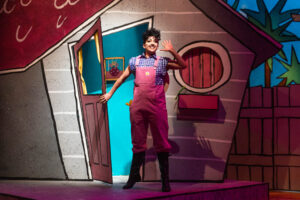
The Glitter Garden. Photo credit Roc Torio.
DOD: George you are an absolutely incredible performer, you are so charismatic, you had all those kids in the palm of your hand right from the beginning. What was it like doing all that audience interaction with children?
GF: Well I’m a host, an MC by trade for drunk adults, so interaction with rowdy children felt exactly the same. I feel like my whole professional life has been leading up to this moment, I’ve been training for rowdy kids. And at some point in the rehearsal process Lori would just switch and say now it’s time for you to deal with hecklers, and she would just heckle through the whole rehearsal process, which was very funny, and occasionally very annoying, but ultimately gave me a lot of quick-fire improvised content to fall back on.
DOD: What challenges did you find in rehearsing the show?
GF: We self-choreographed, that was a really good call, because drag is so personal and if you do drag you create everything yourself, so allowing the individual performers’ personalities to shine through their choreography was very good. But it took more communication and more time. Instead of someone going “5,6,7,8” you’d have a whole group discussion about what’s going to happen.
LL: It was like devising. So we devised choreography.
DOD: And you got some criticism that began with the Taxpayer’s Union questioning Creative New Zealand funding a drag musical for kinds?
GF: We anticipated blowback, because when you take this idea at face value it seems quite controversial, but anyone who came to the show realized it was disgustingly wholesome and adorable and quite uncontroversial. But a person on the internet reading “drag show for kids” immediately think that it’s quite sordid if they come from a certain background. Also some people are just homophobic and terrible, so we had some hate online, which we did anticipate, and the Taxpayer’s Union dug into us and the Deputy Leader of the New Conservative Party shared a thing about us. But ultimately it was fabulous advertising, very stressful, but basically other people said “a drag show for kids, that’s amazing, thank you so much for telling me that that existed”.
DOD: But in a way the show itself was answering that prejudice, in the fact that you got so many mainstream audiences onside.
LL: Everything they said was based on assumption, because they actually didn’t see the show, so they weren’t actually criticizing what we had made because they didn’t even see it. The New Conservative attacks, those were just nasty.
DOD: What kinds of responses have you had to the show?
LL: In my entire career I’ve never received such a response to something that I’ve made, ever. We effectively sold out Circa One for two shows a day for ten performances, so nearly 4,000 people saw the show. Most shows received a standing ovation. We got one on opening night which always feels nice but then it just kept happening and sometimes it was the whole audience and other times it was specific groups. One night it was a group of teenagers who just stood up and gave a nice big supportive standing ovation. Teenagers can’t get into drag shows because they have to be 18 and up so this was one of the only chances if you’re a queer teenager to see this sort of a thing.
To this day people direct message us. Sometimes it’s a queer person who’s just saying, “the show meant so much to me. I cried. Thank you for making it.” Sometimes it’s queer parents who go, “It’s so nice as a queer parent to take my children to something like this.” And it’s effectively just a bunch of mums. We’ve had two direct messages in the last couple of days. One was from a mum who said her three year old is still carrying the programme around and goes to bed with the programme every night and won’t stop talking about it. And we did a relaxed performance and a woman brought her son who suffered from anxiety and she said he’d never been able to make it through a theatre show and he’d made it through this and just loved it. She sent a really detailed message about how engaged her son was with this and then she followed it up a couple of days ago and said that now that school’s back on they had a show-and-tell about what you did over school holidays, and he talked about The Glitter Garden and his teachers were telling his mum about how much his confidence had grown and how much the show had changed him, which is a little bit overwhelming.
GF: I really love that a really straight dad messaged the Hugo account and said that it has really opened his eyes and that he didn’t know who his boys were going to grow up to be and he hopes that they’ll be happy. That’s really beautiful. And one parent of a trans teenager at the show was real blubbery. Being the parent of a trans kid is lonely and I think she really connected to her community.
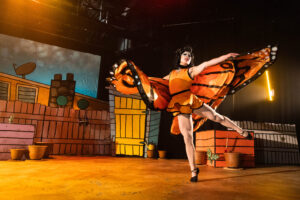
The Glitter Garden. Photo credit Roc Torio
DOD: You’ve created a show that has affected a huge number of people, so what plans do you have for the future?
LL: Well, right now the producer is in talks for a season in Auckland and he’s in touch with other venues in New Zealand for possible tours. We’ve had lots of other places asking for it, so I think step one is touring it around New Zealand. We’ve got a website that’s got the soundtrack on it and information about the show. And after that I don’t know. It’s weird in Covid times to know what the next steps will be or what’s possible, but I know we are growing into something huge and special!
The Glitter Garden will be performed in Auckland in 2021.
This post was written by the author in their personal capacity.The opinions expressed in this article are the author’s own and do not reflect the view of The Theatre Times, their staff or collaborators.
This post was written by David O'Donnell.
The views expressed here belong to the author and do not necessarily reflect our views and opinions.

